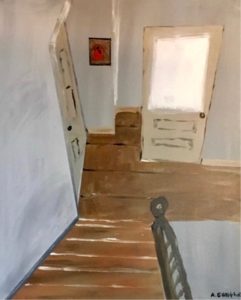June 29, 2020
“THE NARROW LAND,” a novel about artist Edward Hopper but really about us all
By Arthur H. Gunther III
In this moment — perhaps age — of revisiting our past, heralded national leaders, authors, statesmen, etc., it is vital to place actions that today are deemed unacceptable in the context of their history. Society advances in steps taken forward but also by stepping backward.
Accept that Teddy Roosevelt, maybe even Lincoln, will have their official portraits remade with the warts that were evident back when but ignored. Criticize anyone for supporting racism, not tackling inequality, for championing the white man as world savior. Yet also know that without the accomplishments of slaveholders Washington and Jefferson, for example, the promise that is America would not have advanced as it has, however incomplete that is.
In fact, it is in the accomplishments of incomplete “heroes” themselves that humanity can have another chance to do it right, as should have happened in the first place. We can learn from their mistakes.
Just don’t throw the baby out with the bath water.
Such progressive attitude holds for anyone, of course, including world famous artists such as my favorite, realist Edward Hopper, born in Nyack, N.Y.
It took years for the genius and “voice” of this 20th century fellow to blossom, and it did not happen until after he met and married fellow painter Josephine Nivison. Yet it is only in recent years that her absolutely fulfilling part in Hopper’s life and works has been revealed. And she paid a price for the gig.
Not only did Jo give up her own promising art career, but she devoted all her time building up a man who did not, as far as we can tell, appreciate that she was his booster. It was she who contacted his gallery, the Rehn in New York City; she used her inheritance to build a summer studio in South Truro, Cape Cod; she meticulously kept notes on his works; above all, Jo was the light in his dark tunnel of doubt.
Hopper, world-revered for such works as the urban “Nighthawks” and the Cape Cod paintings, did not marry until age 42. Then his career took off. Yet he seemed unsuited to living with someone, a man “looking” for himself in his works, a loner, a person who did not easily share thoughts. He painted instead. He ignored at will.
Hopper has become an American hero, a worldwide artistic interpreter of the need for solitude, the search for simplicity in an ever-more-complex time. The price for his genius was wife Jo, an outgoing woman who was cloistered in the studio home of a man whose expressed being had to be extracted for the world to see, to relate to, to understand. She pulled all that out but received scant thanks.
There was great good done in that sacrifice, drawing out the language of a gifted man, a giving for us all, but at the cost of a woman’s uncompleted being.
This is all so very clear in a recent novel, “The Narrow Land” by Christine Dwyer Hickey. Set on Cape Cod in 1950, it brings the Hoppers into contact with two young boys, one fellow’s family and the dynamics of life shortly post-war in a summer vacation spot not yet invaded by the hordes of the 1970s-on.
It is a journey of a season: loneliness for Jo, more doubt for Hopper in his artist’s block, everyone’s failings shown.
“The Narrow Land” is in Dwyer’s quite descriptive words an offered puzzle that might be assembled by viewing Hopper paintings. He may have been looking for himself, but he found us all. Warts and all. Heroes fallen as well.
The writer is a retired newspaperman and a volunteer at the Edward Hopper Museum and Study Center in Nyack, N.Y. (ahgunther@yahoo.com)
–30–

